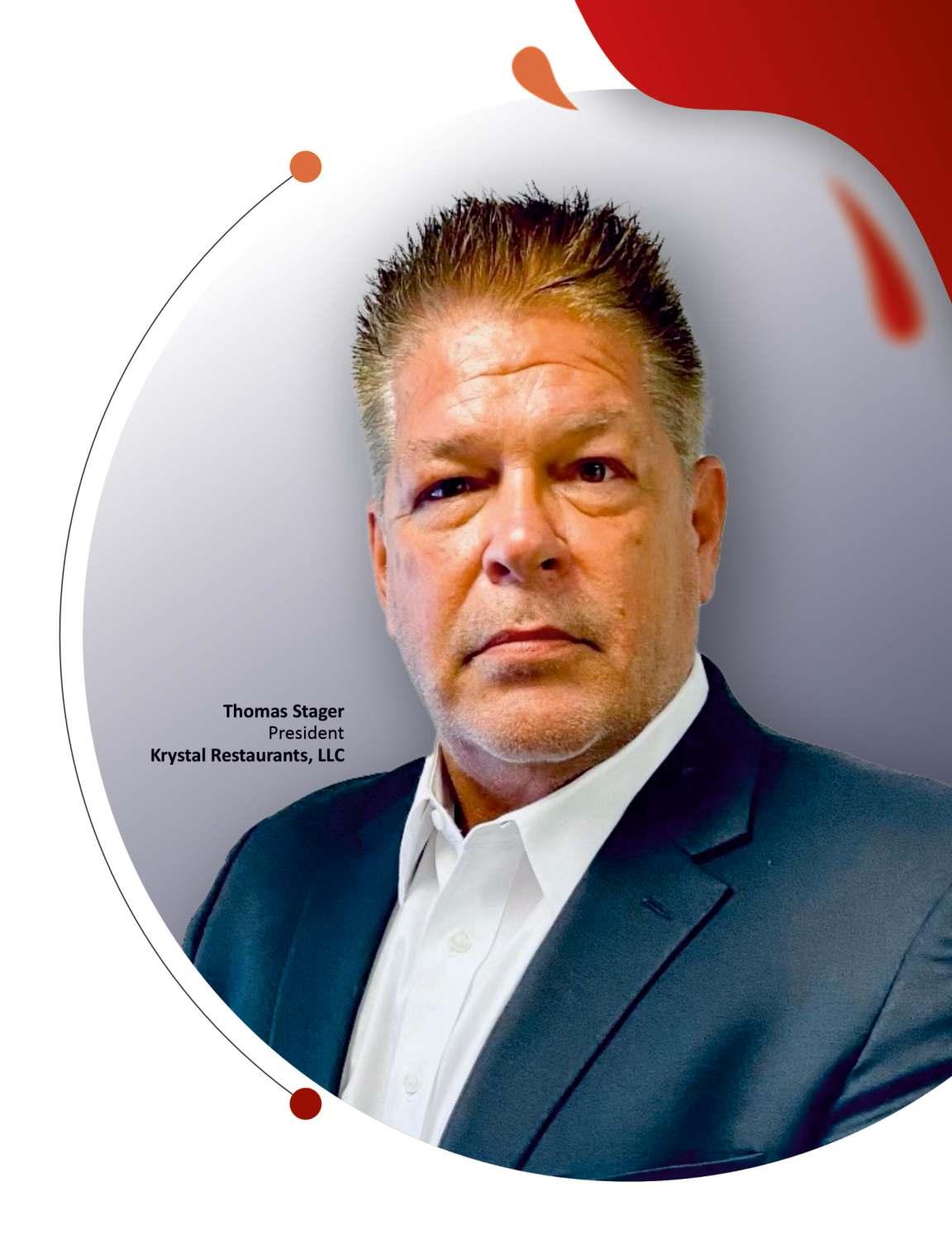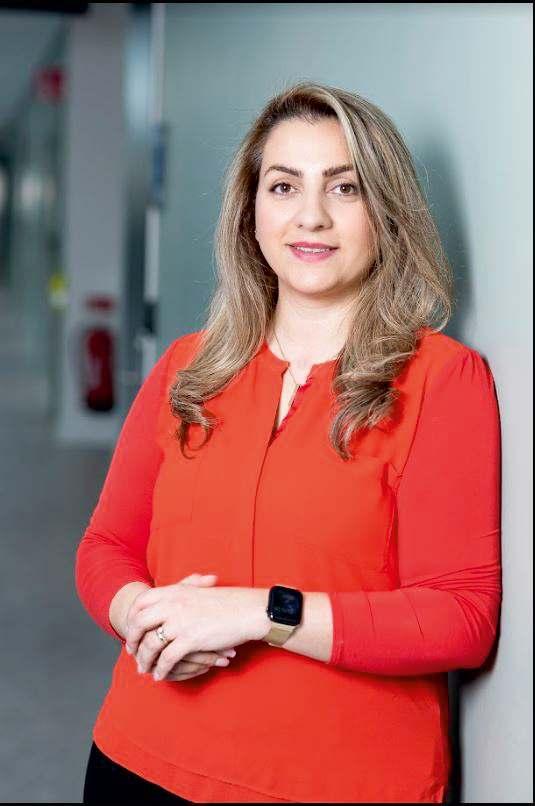Industry Insights


Embracing the emerging trends in the Global F&B Sector
Novel Perspec�ves
Understanding the Traits of Influen�al Leaders of Business Arena

VOL 01 I ISSUE 06 I 2023



F o o d Food is not rational. is culture, habit, is craving, and and i d e n t i t y . identity.


#ciolookmagazine
Editors Note

Quest of Brilliance
hain restaurants are a prominent and C competitive industry, and the most influential chain restaurant leaders possess certain qualities that set them apart from their competitors. Here are some of the qualities of the most influential chain restaurant leaders:
The most influential chain restaurant leaders possess strong business acumen, which enables them to make informed decisions and drive their organizations to success. They understand the financial and operational aspects of the industry and are able to develop and execute strategies that maximize profits while ensuring customer satisfaction.
Successful chain restaurant leaders prioritize customer satisfaction above all else. They understand the importance of creating a positive dining experience for their customers and are always looking for ways to improve their menu offerings, service, and overall atmosphere. They listen to customer feedback and use it to inform their decisions and strategies. The most influential chain restaurant leaders are always looking for ways to innovate and stay ahead of the curve. They are not afraid to take risks and try new things, whether it's developing a new menu item or implementing new technology to improve the customer experience.
Effective chain restaurant leaders possess strong leadership skills, which enable them to inspire and motivate their teams to achieve success. They set clear expectations and goals, communicate effectively with their teams, and lead by example. They are able to create a positive and supportive work environment that fosters collaboration and innovation.
The restaurant industry is constantly changing, and the most influential chain restaurant leaders are able to adapt to new trends and challenges quickly and effectively. They are able to pivot their strategies when necessary and make informed decisions in the face of uncertainty.
The most influential chain restaurant leaders are committed to providing high-quality food, service, and overall experience to their customers. They prioritize quality over quantity and are willing to invest in their products and services to ensure that they meet the highest standards. These leaders possess a unique set of qualities that enable them to drive success in a competitive industry. They possess strong business acumen, customer focus, innovation, leadership skills, adaptability, and a commitment to quality.
By cultivating these qualities, leaders can inspire their teams to achieve unprecedented success and drive the chain restaurant industry forward. Embracing the journey of these business leaders in the chain restaurant niche, CIOLook spotlights The Most Influential Chain Restaurant Leaders 2023.
Flip through the pages and indulge in the odyssey of excellence with eternal advancements that these staunch business leaders are empowering in the everevolving F&B niche.
Have a delightful Read! Abhishek
 Joshi
Joshi
A bhishe k J o shi




CONTENTS COVER STORY ARTICLES Industry Insights Embracing the emerging trends in the Global F&B Sector Novel Perspectives Understanding the Traits of Influen�al Leaders of Business Arena 08 28 18
The Need for Compassion During a Global Pandemic

The need for setting a positive work culture for remote employees



24 32 22
The Professional Odyssey of Zara Zamani
Pooja M Bansal Editor-in-Chief
CONTENT
Senior Editor Alan Swann
Executive Editors AbhishekJoshi
Alex Spellman
DESIGN

Visualizer Dave Bates
Art & Design Director Revati Badkas
Associate Designer Ankita Pandharpure
SALES
Senior Sales Manager Sihanee M., Rouniyar A.
Customer Success Manager Jack Ryan, Prathamesh

Sales Executives John, Rohit
TECHNICAL
Technical Head Prachi Mokashi
Technical Consultant Victor Collins
SME-SMO
Research Analyst Eric Smith
SEO Executive Sagar Lhigade
FOLLOW US ON www.facebook.com/ciolook
www.twitter.com/ciolook
WE ARE ALSO AVAILABLE ON Email info@ciolook.com For Subscription www.ciolook.com
CONTACT US ON
Copyright © 2023 CIOLOOK, All rights reserved. The content and images used in this magazine should not be reproduced or transmitted in any form or by any means, electronic, mechanical, photocopying, recording or otherwise, without prior permission from CIOLOOK. Reprint rights remain solely with CIOLOOK.
sales@ciolook.com
January, 2023

Thomas
Brief Company Name
Emily
has been helping businesses and individuals shape up and live up to their potential goals of financial success.
Krystal Restaurants, LLC krystal.com ChromaWay chromaway.com
Susan is a passionate and driven marketer who excels in identifying powerful consumer insights that build winning new product ideas.
Thomas is an expert in operational turnaround, expansion and rejuvenating the brand by growing sales and

Zara strives to provide blockchain applications that are easy to use and create real value in society by providing transparent systems that enhance efficiency and reduce exploitation.
 Suzie Yorke CEO, Co-founder
Leanne Bonner-Cooke CEO
Leanne established e-Bate; UK’s first end-to-end highly configurable SaaS, Price and Margin Management solution. E-bate e-bate.io The Better Chocolate thebetterchocolates.ca
Emily Hartstone Founder & CEO
Hartstone,
From The Hart Management fromthehartllc.com
Stager President
profit.
Zara Zamani Chief Solutions Officer
Featured Person
Suzie Yorke CEO, Co-founder
Leanne Bonner-Cooke CEO
Leanne established e-Bate; UK’s first end-to-end highly configurable SaaS, Price and Margin Management solution. E-bate e-bate.io The Better Chocolate thebetterchocolates.ca
Emily Hartstone Founder & CEO
Hartstone,
From The Hart Management fromthehartllc.com
Stager President
profit.
Zara Zamani Chief Solutions Officer
Featured Person
To climb aboard a sinking ship by all accounts is a foolish move, not to mention thinking you can save it. But this is precisely what Thomas Stager does. Thomas is an executive who specializes in turnarounds. An expert in operational turnaround, expansion, and rejuvenating brands by growing sales and profit – Thomas believes in a hands-on, resultoriented leadership style that assembles managers and leaders to develop high-performance teams, deliver outstanding revenue, and execute plans that result in increased shareholder value.

It is precisely this expertise that landed him the position of President at Krystal Restaurants, a 90-year-old franchise that was struggling to maintain its business in the lockdown. Thomas not only led the organization successfully through the pandemic but also scaled its success to new heights by launching initiatives and developing strategies that prioritized people, sales, profit, operations, and culture.

Impressed with his work, CIOLook reached out to Thomas Stager, asking him to share his journey as a

As an opera�ons guy, I would like to see every one, from finance to social media, spend some �me in the restaurants so they can see what impact their work has on our front-line workers.


business leader, his successes in creating turnarounds for multiple organizations, and his vision for Krystal Restaurants.
Below are the highlights of the interview:
Brief our audience about your journey as a business leader until your current position at Krystal Restaurants. What challenges have you had to overcome to reach where you are today?
I started my professional journey with the Arby’s Restaurant Group and dedicated nearly three decades to the organization. During my tenure with Arby’s, I focused on operations and developing strong teams to help lead to growth and success. Throughout my career, I’ve taken on leadership roles that have allowed me to help and develop others expand their potential and, in turn, help organizations flourish.
I firmly believe in strong communication across the board, from executives to managers to field teams and beyond. I also believe in being hands-on to rally the troops and demonstrate that I’m also acting for our shared goals and missions.
After Arby’s, I moved on to the fitness space and served as COO for Jakked Dragon - Crossfit and then headed Next Level Training as CEO.
In 2018, I took on the COO role for Golden Child Holdings & GC Pizza Hut. This was a historic time for the organization, as GC Pizza Hut was on track for a $2.8 million store-level EBITDA improvement on top of a 2% minimum wage hike increase. During my time with the company, I was part of a successful turnaround that focused on people, sales, profit, operations, and culture. I later transitioned to CEO for GC Pizza Hut & Partner with Golden Child Holdings.
My extensive and successful turnaround experience is what brought me to Krystal. I joined the organization in 2020, during the height of the pandemic when many restaurants and companies were struggling. The company was not only dealing with the pandemic but also with new ownership. I’ve taken the vast experience I gained throughout my career and am channeling my energy to turn our legacy brand into a legendary one.
At Krystal, I’ve focused on growing our teams as well as helping build our future leaders. Last year, we launched
a new paid internship program that was my brainchild and means a lot to me.
The program provided college students with the opportunity to gain real-world experience at our company and connect them with professionals who are active in the careers that they’re looking to pursue. It was very exciting to see the program come to fruition for our company to be able to offer this opportunity to students.
Tell us something more about your company and its mission and vision.
As a legacy brand, there’s a fine balance between staying true to our heritage while also evolving to stay current with the times. Over the years, we have developed a unique and highly craveable menu, which we remain steadfast in maintaining. We’ve also offered our food at a great value, and we’re committed to that as well. We strive to consistently deliver with our food, value, and our connection to our fans. In building loyalty, it’s imperative to be genuine and find those shared connections with customers, as well as our teams and partners.

Enlighten us on how you have impacted the restaurant industry through your expertise in the market.
Throughout my career, I have served in leadership positions that have allowed me to cultivate my skills to become a turnaround expert. This has included operational turnarounds, as well as strategic planning for expansion and rejuvenating brands. With my 30+ years in the industry, I’ve been fortunate to work alongside teams who are committed to growth and change and are willing to go on these journeys with me to make the significant shifts required to succeed in turnarounds. Again, it’s the strong and open communication, trust building, and development of solid teams that can help drive success.
From my years with the Arby’s Restaurant Group to GC Pizza to where I am now with Krystal, I have been able to really dig into these brands, connect with the people, and find solutions to help grow and evolve.
Describe in detail the values and the work culture that drives your organization.
When I joined the organization, our team developed

I HOPE TO CONTINUE TO GUIDE KRYSTAL RESTAU RANTS INTO ITS NEXT EVOLUTION FROM LEG ACY TO LEGENDARY. I WANT TO ATTRACT MORE FRANCHISEES TO OUR CONCEPT AND DOMINATE THE MARKETS IN WHICH WE DO BUSINESS.


OVER THE YEARS, WE HAVE DEVEL OPED A UNIQUE AND HIGHLY CRAVEABLE MENU, WHICH WE REMAIN STEADFAST IN MAINTAINING.


core pillars to help steer the brand as it was undergoing a turnaround. The U.N.I.T.E.D. initiative underscores the following for team members across our system: Value the Truth, Enjoy Your Work, Make Informed Decisions, Be Accountable to Our Guests, Grow and Evolve, and Find a Way. The initiative places priorities on people, sales, profit, operations, and culture.
Over the past two years, we have been laser-focused on our people, from upgrading our leadership teams and filling critical management positions to creating and implementing bench guidelines and tools for corporate and field operations. We developed a Future Leader Program and have been strengthening our collaborations with franchisees. We also developed and launched our Talent Lifecycle Tools and Guidelines to support the hiring and processing of team members.
Our turnaround approach has been a holistic one that involves creating a culture that embraces our diverse community of team members and encourages open lines of communication. To support our varied groups of employees, we reinvigorated our Young Professionals Employee Resource Group, created and launched a Veteran Recognition Program, and created and implemented an Intern Program. To encourage dialogue among key team members, we created and implemented Krystal Breaks- monthly Zoom Communications with District Managers and corporate teams.
A safe workspace is paramount, so we launched our Talk to Me program, which encourages employees to speak up if they feel, hear, or see something that requires special attention.
Undeniably, technology is playing a significant role in almost every sector. How are you leveraging technological advancements to make your solutions resourceful?
Over the past two years, we’ve implemented 30 new POS/BOS franchise systems to support our partners. We continually work with franchise partners to develop systems that fit their needs and help them run their businesses as efficiently as possible.
For our latest restaurant prototype, we took a look at our kitchens and reworked the designs to elevate execution. As new tech becomes available, we explore these options and how we can continue to improve for the benefit of our teams and franchise partners.
As the consumer landscape changes, we’re also implementing and exploring ways to better serve our guests while also meeting them where they are with technology. Many younger consumers, who grew up with tech, prefer to use these tools for their everyday lives, including how they interact with restaurants, order food, and more.

What change would you like to bring to the restaurant industry if given a chance?

As an operations guy, I would like to see everyone, from finance to social media, spend some time in the restaurants so they can see what impact their work has on our front-line workers. These individuals are the backbone of our organization and keep our brand running. It’s critical to personally see and understand these impacts, especially as we look to grow as a collective.
What, according to you, could be the next significant change in the restaurant industry? How is your company preparing to be a part of that change?
I think you will see smaller and smaller footprints, more automation, and virtual brands working alongside


bricks and mortar locations. Our latest restaurant prototype is an example of this. We’ve reduced the footprint and added a second drive-thru, as well as a pickup area for online orders and third-party delivery.
During the pandemic, a number of restaurants, including ours, focused on off-premises services. This is something that is on the rise and will continue to expand.
Where do you envision yourself to be in the long run, and what are your future goals for Krystal Restaurants?
I hope to continue to guide this brand into its next evolution from legacy to legendary. I want to attract more franchisees to our concept and dominate the markets in which we do business. Our teams have been dedicated to growing our franchise program, which offers comprehensive support for our partners.
Franchisee collaboration and trust are critical for us. We try to involve our franchise partners, when possible, in our development efforts. They are key to our growth, and we strive to demonstrate how important they are by turning to them for ideas and input on how we plan for the future.
To attract new franchise partners, we’ve been developing new restaurant designs that are operationally sound and enable our franchise partners to maximize their investment. Our new design drives down labor costs while increasing the speed of service and, in turn, creating a better guest experience.


What would be your advice to budding entrepreneurs who aspire to venture into the restaurant industry?
My advice to budding entrepreneurs is to believe in themselves and set their minds on achieving their goals. When building your business, create a culture where people want to work, hire a great team, pay them well, and give them the flexibility to do their job. People like three things when it comes to work: autonomy, a great work environment, and money. If you can hit these drivers, then you can set yourself on the path toward success in the industry.








1 Year 12 Issues $250 6 Months 6 Issues $130 3 Months 3 Issues $70 1 Month 1 Issue $25 CHOOSE OUR SUBSCRIPTION Stay in the known. Subscribe to CIOLOOK Get CIOLOOK Magazine in print, and digital on www.ciolook.com
Embracing the Emerging Trends Emerging Trends in the Global F & B Sector




www.ciolook.com | January 2023 | 18
The food and beverage (F&B) sector is a dynamic


and ever-evolving industry that is constantly influenced by new technologies, consumer preferences, and economic trends. Embracing emerging trends is essential for businesses in this sector to stay competitive and relevant in the global market. Here are some of the emerging trends in the F&B sector:


Plant-Based and Vegan Foods : With the rise of conscious eating and health concerns, there has been a growing demand for plant-based and vegan food options. More people are opting for plant-based foods and are reducing or eliminating meat and dairy from their diets. The F&B sector needs to cater to this trend
by offering innovative plant-based options that taste great and are nutritionally balanced.
Plant-based and vegan diets are often associated with numerous health benefits, such as a lower risk of heart disease, high blood pressure, type 2 diabetes, and certain types of cancer. These diets are often rich in fiber, vitamins, minerals, and antioxidants that support good health and well-being.
This food is environmentally sustainable and has a lower carbon footprint compared to animal-based diets. The production of animal-based foods requires more resources such as water, land, and energy, and
Industry Insights
www.ciolook.com | January 2023 | 19
contributes to deforestation, greenhouse gas emissions, and pollution. It is also more affordable than animal-based diets, especially when considering the long-term health and environmental benefits. Plantbased foods such as grains, legumes, and vegetables are often less expensive than meat and dairy products.
Sustainability : Consumers are becoming increasingly aware of the impact of their food choices on the environment. Sustainability is an emerging trend in the F&B sector, with businesses looking for ways to reduce waste and carbon emissions, and to source ingredients responsibly. Companies that adopt sustainable practices will appeal to consumers who are concerned about the environment and looking for eco-friendly options.
Traditional ethnic cuisine often uses locally sourced, seasonal ingredients, and follows sustainable food practices that support the environment and local communities. By consuming authentic and ethnic cuisine, individuals can support sustainable food systems and promote environmentally conscious practices.
Health and Wellness : The F&B sector is increasingly focusing on health and wellness. Consumers are becoming more health-conscious and are looking for foods that are low in sugar, fat, and calories, and that contain beneficial nutrients. Businesses that offer healthy and nutritious options will appeal to this trend and attract health-conscious consumers.

Digital Transformation : The F&B sector is embracing digital transformation with the integration of technology in various aspects of the business, from online ordering and delivery to automation in the kitchen. Businesses that embrace digital transformation will have a competitive advantage in the market and will appeal to consumers who prefer convenient and efficient options.
Digital transformation allows businesses to streamline their operations, reducing wait times and increasing efficiency. By implementing online ordering and payment systems, businesses can reduce errors, improve accuracy, and speed up the ordering process, resulting in a better customer experience. Digital transformation provides businesses with access to data and analytics tools that can help them make informed decisions and optimize their operations. By analyzing
customer data, sales trends, and other key metrics, businesses can identify areas for improvement and make data-driven decisions that drive growth and profitability.

Digital transformation helps businesses improve their inventory management by providing real-time data on stock levels, sales trends, and customer preferences. This information can help businesses optimize their inventory levels, reduce waste, and improve profitability.
Authentic and Ethnic Cuisine : Consumers are becoming more adventurous in their food choices and are seeking out authentic and ethnic cuisine. Businesses that offer unique and culturally diverse food options will attract consumers who are looking for new and exciting culinary experiences.
Authentic and ethnic cuisine offers a unique blend of flavors and ingredients that are often not found in Western cuisine. It provides an opportunity to experiment with new and exciting tastes, textures, and aromas, making the dining experience more enjoyable and adventurous. Many traditional ethnic dishes are often based on whole foods such as grains, legumes, vegetables, and fruits, making them nutritionally balanced and healthy. They often contain a variety of vitamins, minerals, and antioxidants that promote good health and well-being.
Consuming authentic and ethnic cuisine provides several benefits that promote cultural diversity, unique flavors and ingredients, nutritional value, social connection, and sustainability. It provides an opportunity to learn about and appreciate different cultures and traditions, making the dining experience more enjoyable, meaningful, and fulfilling.
In conclusion, embracing emerging trends is essential for businesses in the F&B sector to stay competitive and relevant in the global market. By adopting sustainable practices, offering plant-based and vegan options, focusing on health and wellness, embracing digital transformation, and offering authentic and ethnic cuisine, businesses can appeal to the changing needs and preferences of consumers in the F&B sector.
www.ciolook.com | January 2023 | 20



Compassion During a Gl Pandemic The Need for Gl Pandemic
Respectfully Submitted by Emily Hartstone, Founder & CEO of From The Hart Management, LLC
Since the start of dreaded COVID-19, one thing has become clear: there is a huge shortage of compassion in the world, both in the workplace and in society as a whole. The effects of the pandemic on global health, economic activity, and daily lives have emotionally overwhelmed peopled so much, it's no wonder in a recent survey almost half of the respondents stated that the pandemic has had a negative impact on their mental health.
A large-scale crisis such as this forces leadership to strip down to its most fundamental basic: making a positive difference in people's lives. It is now imperative that leaders demonstrate compassionate leadership and make dealing with unfolding tragedies the first priority.
Compassion rises from awareness of human suffering, emotional resonance with that suffering, and action to relieve that suffering. In other words, awareness + empathy + action = compassion. Compassion fuels commitment and innovation, and numerous studies show that compassionate leaders foster more loyalty and engagement by their teams.
While the world is facing a global pandemic, social injustice is also coming to an all-time high. In a recent survey, over 40% of people responded that they feel the world is going backwards instead of moving forward.
More than ever, employees are looking for places to work with a positive and inclusive culture. In fact, in that same survey, this was the number one thing they were looking for in a workplace.
The mental health of people is already at a low, and throwing social injustice into the mix doesn't help. It is imperative now more than ever, leaders are aware and paying attention to well-being of their team members. If an event happens that you feel might impact someone on your team, hold a meeting and check-in with them. Showing this type of compassion builds trust and loyalty. It creates a "safe space" for them instead of additional anxiety into an already stressful environment.
The need for compassion isn't just about achieving organizational resiliency and a better work environment. ALL of society, whether in business or every day life, must remember that we are all in this TOGETHER. Personally, I cannot wrap my head around the fact racism and antisemitism still exists, and it disgusts me to my core.
This. Has. To. Stop.
We are ALL born as loving people who believe everyone is equal. We must learn to continue to carry this love for humanity throughout our lives. No matter what your race, sexual preference, gender identity, religion, etc. –we are ALL PEOPLE. We all have a beating heart, and we all have feelings.
www.ciolook.com | January 2023 | 22
Emily Hartstone Founder & CEO From The Hart Management


So, in closing, I will ask you this. If you have (or had) a little girl or little boy and knew they were being bullied in school because of what they looked like, how would you feel? If someone told you that you were not allowed to go somewhere because you did or didn't take the vaccine (other than Government travel regulated) because of political preference, how would you feel? Whether you want to admit it or not, the answer is "Awful!" So please, have some more compassion, be a little nicer, and remember you never know what the person next to you has been through. Don't judge a book by its cover.
EVERY person can make a difference. Let's be the generation of changemakers.
CXO
www.ciolook.com | January 2023 | 23
The need for setting a positive work culture for remote employees
Running a business in 2023 certainly has more
challenges than in previous years, most of which are centred around the way teams work together, either as a fully remote team or operating a hybrid model. But how does this impact businesses? How do we provide a positive work culture for those who are not based in a central head office? And, most importantly, how important is a positive work culture for the success and growth of a business?
Leanne Bonner-Cooke MBE launched her fintech SaaS business, e-bate Limited, in 2018 with a handful of employees. Now, after 4 successful rounds of investment and nearly 40 people on the payroll, CEO Leanne and her team have grown their client base and strengthened their plans for the future as the leading intelligent rebate management software solution. With most of her employees based at home in the UK and intercontinentally in Europe, the USA, and Asia, we thought we’d ask Leanne for her thoughts on positive work culture for remote employees.

How do you think remote working has changed office culture in the last three years?
It’s changed it significantly. When you work in an office with others, you form a community, and I think you lose some of that when you’re remote working. It has its benefits in terms of flexibility for workers, but at times, people can feel very isolated and not part of that office comradery that most of us enjoy at work. This makes it even more important to ask yourselves how you can
make people feel involved and how you establish a company culture. Forming and establishing a culture can be problematic enough in one location, so doing it (in our case) in over 35 locations, can be significantly challenging for any business.
Has your leadership style changed since operating a more remote workforce, and how has it translated from office to home workers?
I’d say that staying in touch is now even more important than before. We have daily sessions and stand-ups with various teams to stay connected, and communicating more often with my senior leadership team has been critically important. We have daily catch-ups with the engineering team, then weekly stand-ups with the management team, sales and marketing teams, etc., even if there’s nothing to say. It’s important to give everyone an opportunity to speak and raise issues and plan and share ideas.
However, I do feel that there are those micro-moments in the office where you might overhear something that you can contribute to. Hence, our newest initiative involves having a virtual office where employees will be online with each other all day long. In a virtual office, people can chat, hear phone calls, and see each other, just like in an actual office. It also removes the presumption that some team members aren’t working as hard as others at home and provides an opportunity to collaborate.
www.ciolook.com | January 2023 | 24

www.ciolook.com | January 2023 | 25
Leanne Bonner-Cooke CEO

www.ciolook.com | January 2023 | 26
Is it possible to have a positive work culture in a hybrid environment?


Absolutely, but you just have to work harder at it. We’ve introduced more engagement tools to assess how people are feeling. They can help you identify if you have a functional problem, a systematic problem, or a problem you would have had even if everyone was working at the office, and essentially if the problem in question relates to hybrid or remote working. This allows us to tackle issues accordingly and keep people happy and engaged.
Are there mental health affects or benefits from remote working?
There are benefits because people have more time to do things like wash on or tidy up at home during their breaks. If they were in the office these home-based tasks can build up and play on a person’s mind causing overwhelm. Also, those with children have more time to organise school runs which takes the chaos out of a morning before work meaning they’re more relaxed and ready for the working day. Essentially, it’s removed the pressure on people’s lives.
However, the negative impact on mental health is isolation. When employees don’t have a huge network of friends and family, their co-workers become that support, so it’s important, where possible, to encourage social events for employees that bring them back together to unwind and enjoy activities outside of work.
At e-bate we try to stay aware of changes in attitude and mood - we have a ships council who arranges individual meetings to allow employees to share how they’re feeling psychologically, more one to ones, and counselling support. We’ve also introduced an employee engagement app called Wotter which we are hoping will help us too.
How does having a positive workforce affect a business?
If you’ve got a happy and engaged workforce, it’s a fact that performance goes up. However, statistically, only 30% of our workforce is performant in the UK, which is a shockingly low stat. So my advice to other businesses would be to create an environment that makes people feel like they want to come to work and they want to do
a good job. Your attitude will be influenced by how you’re thinking and feeling as well as how you’re rewarded by your employer. Once you’re in a negative space, you’ll lose motivation and then performance will suffer. So, identifying when an employee isn’t in a good place is really important - your people ARE your business, so by looking after them, you will be looking after and protecting your business.
What advice would you give to a business that is considering introducing remote working for their employees?
Communicate! Communication has always been key, but with remote working, it has to be bigger and better than ever before. In our business, we introduced more 121’s and management training to help us identify when an employee is disengaged, upset or struggling, for example. Without seeing someone in person, you can’t see their body language and other signs that would tell you if something is wrong, so you have to put processes in place to combat this. Without these tools and processes, it is likely that productivity could reduce.
www.ciolook.com | January 2023 | 27
To find out more about Founder and CEO Leanne Boner-Cooke and e-bate, the intelligent rebate management software solution for any industry. visit e-bate.io.
U n d e r s t a n d i n g Understanding the Traits of Influential Leaders of B u s i n e s s A r e n a
nfluential business leaders are those who inspire I and motivate others to achieve success. They possess certain traits and characteristics that set them apart from others. In this article, we will explore the key traits of influential business leaders.


Visionary Thinking
Influential business leaders are visionary thinkers. They have a clear understanding of their organization's mission, values, and goals. They are able to create a compelling vision for the future and communicate it effectively to others. By having a clear vision, they are able to inspire and motivate employees to work towards common goals.
Visionary thinking creates a clear focus for individuals and organizations. It helps them to identify their priorities and goals and to align their actions accordingly. This focus enables individuals and
organizations to work more efficiently and effectively towards achieving their vision.
Visionary thinking drives change. By envisioning a future state that is different from the present, individuals and organizations can create a sense of urgency and a desire for change. This can motivate individuals and organizations to take action, to try new things, and to drive innovation and growth. It creates a clear focus for individuals and organizations. It helps them to identify their priorities and goals and to align their actions accordingly. This focus enables individuals and organizations to work more efficiently and effectively towards achieving their vision.
Strong Communication Skills
Influential business leaders have strong communication skills. They are able to convey their ideas and vision

Novel Perspectives
www.ciolook.com | January 2023 | 28



www.ciolook.com | January 2023 | 29
clearly and effectively to others. They are good listeners, able to take feedback and ideas from others and incorporate them into their own thinking. They also have the ability to inspire and motivate others through their words and actions.
Strong communication skills build strong relationships. By being able to communicate effectively, individuals can establish rapport with others, build trust, and foster a sense of community. This can lead to better collaboration, increased productivity, and improved morale.
Strong communication skills enhance leadership. By being able to communicate effectively, leaders can inspire and motivate their team, provide direction and feedback, and build a culture of trust and collaboration. This can lead to increased employee engagement, improved performance, and better results.
Decisiveness

Influential business leaders are decisive. They are able to make tough decisions quickly and effectively. They are able to analyze complex situations and make decisions based on their experience, intuition, and data. They are also able to communicate their decisions clearly and effectively to others.
Decisiveness increases productivity. By making quick and effective decisions, individuals and organizations can save time and resources. They can avoid wasting time and energy on indecision or delay. This increased productivity can lead to greater success and the achievement of goals.
Decisiveness improves problem-solving skills. By analyzing information and making decisions quickly and effectively, individuals and organizations can develop their problem-solving skills. They can learn to identify the root causes of problems, evaluate options, and take action to resolve issues.
Decisiveness builds confidence. When individuals and organizations make decisions quickly and confidently, they demonstrate their competence and expertise. This confidence can inspire trust and respect from others, leading to greater opportunities and success.
Resilience
Influential business leaders are resilient. They are able to bounce back from setbacks and failures. They are able to maintain their focus and commitment to their vision, even in the face of adversity. They are also able to learn from their mistakes and use them as opportunities for growth and improvement.
Emotional Intelligence
Influential business leaders have high emotional intelligence. They are able to understand and manage their own emotions effectively. They are also able to empathize with others and understand their perspective. This allows them to build strong relationships with employees, customers, and other stakeholders.
Strategic Thinking

Influential business leaders are strategic thinkers. They are able to see the big picture and develop strategies to achieve their vision. They are able to analyze trends, anticipate challenges, and develop plans to address them. They are also able to adjust their strategies as needed to respond to changing circumstances.
In conclusion, influential business leaders possess a unique set of traits and characteristics that enable them to inspire and motivate others to achieve success. By exhibiting visionary thinking, strong communication skills, decisiveness, resilience, emotional intelligence, and strategic thinking, influential business leaders are able to create a positive impact on their organizations and the wider business community.
www.ciolook.com | January 2023 | 30

The Professional Odyssey of Zara Zamani
When I was about to graduate as an engineer. I
studied Electrical and Electronics and Petroleum Engineering at University Technology Petronas, where I was under full scholarship by Petronas as a top student. Like every student, I was worried about finding job. However, I never wanted A job, I always wanted THE job. The job, for me was something that would enable me to travel the world and experience with highly skilled professionals as much as possible. So, I started writing what I would expect from companies and sending emails to the ones at the time I thought would be the right fit for me.
I guess I always knew what I exactly want. Out of that effort, I had 8 job offers from top global companies by the time I graduated, and I started my career at one, Schlumberger, the number one oil and gas service company in the world as a wireline field engineer. Throughout my career in oil and gas industry, I worked in many different countries mostly in very tough and harsh environments with almost no other female engineer at work. Often it was me and 10s and 100s of men on offshore on land rigs. Alongside to brilliant technical skills I gained, I also learned how to communicate with different cultures, how to be patient, how to manage people plus lots of delivery management skills. After a few years I was thinking highly of myself and my skillset. But everything changed when I shifted my career to entrepreneurship instead.
At some point in my career, I thought I need more to be happy. I needed to be part of change-making wave. I wanted to be able to leave a legacy behind, and that was not very possible where I was. So, I decided to step into the path of entrepreneurship in what I thought I am good at and feel comfortable with, Technology. I became an entrepreneur in TravelTech and FinTech
industries and eventually started working with blockchain since 2015 and found blockchain to be THE technology that enables me to make the change I want which was to make the world a fairer place for all. This personal passion came from me living in many different countries and facing the brutal reality of how unfair the world is in many ways such as wealth, influence, education, power and acceptance centralization to certain geographical regions. I have worked with blockchain since then in many industries such as healthcare, logistics, education, energy, gaming, finance, retail and fashion and now strongly in virtual world and metaverse.
AT different level are my maturity and growth in my career, I have faced different challenges. From being a girl and having limited access to opportunities in Iran to leaving my whole family to live abroad alone for education and to starting a career in super male dominant industry and moving to tech which was not less male-dominant. As a woman I have constantly face challenges. However, at some point, I forget about it totally, and that was when I started to face challenges of building and growing a business. People management, relationship building, networking, being super multifunctional yet keeping that strategic and holistic view to ensure my team are walking the right direction. In general, being responsible for lives of 100s directly and indirectly. I can say I have taken three approaches to overcome challenges:
1. Constant Learning: I always know I do not know it all and I constantly try to learn. I am currently pursuing my PhD studies in Blockchain technology for example.
2. Have a mentor: I always make sure I have inspiring mentors by my side. People I can learn about and validate my thought with.

www.ciolook.com | January 2023 | 32


www.ciolook.com | January 2023 | 33

www.ciolook.com | January 2023 | 34
3. Surrounding myself with likeminded people: Making sure I have visionary, ambitious people who share the passion of making the world a better place and drive me towards it has been a source of energy for sure.
About the Companies
ChromaWay was founded in 2014 with our relational blockchain model, called Postchain, which proved itself to be an excellent platform for private enterprise blockchain applications. Since then, the team and vision surrounding the company have grown exponentially. In addition to our private enterprise work through ChromaWay, we have also launched a public platform called Chromia, which boasts a rapidly expanding ecosystem.
We strive to provide blockchain applications that are easy to use and create real value in society by providing transparent systems that enhance efficiency and reduce exploitation. ChromaWay was named among the 50 fastest growing tech companies in 2021 by Deloitte.
Additionally, Neoki, founded in 2021 is a decentralized multi-Metaverse, virtual reality platform powered by Blockchain, for the world of design and creativity. Our vision is to offer a profoundly immersive design based Metaverse to democratize the design industry through introducing concepts such as:
Design to Earn allows every user to create an economy around their obvious or hidden talents.

DAO to be utilized as an infrastructure that allows every member of the community to be seen and have a say in decision-making and therefore bring out the real meaning of democratization.
Collaborate to Earn provides an incentivizing model for users and community members to interact and collaborate with each other.
Multi-Metaverse as a means to enable community members to build their own verse in our Metaverse.

Anyone or entity who is either an end customer of a piece, a talent, a designer, a collector, a brand, a design house, a design school, a manufacturer, or is in any other way connected to a design piece of interior, fashion- accessory, jewellery, art, automotive, architecture, industrial piece, etc can create,
commercialize design, purchase design piece, collaborate, educate, and monetize their content. The Community of Neoki permanently owns the land parcels in which they fully control and decide on what content is published which can vary from an art, democratized, fast, and direct communication and connection to its users without any intermediary. Neoki was nominated as top 5 blockchain companies of Europe in 2022.
Special about the companies

We at ChromaWay are at the bleeding edge of technology by creating Chromia, a permissionless blockchain protocol that enables everyone to build the Dapp of their dream and transfers power back to public while being a pioneer in building blockchain games, fashion Dapps, DeFi and tokenization Dapps.
Where will we be in future?
I envision myself building, building and building for the next decades. I have no other path to encourage more people to join us in this movement of making the work a fairer place and giving freedom back to public. I see ChromaWay definitely being a pioneer and an example not only in the world of tech but also in the world of crypto and blockchain as a company that lives truly to the meaning of decentralization.
And I see Neoki as that one Metaverse world that instead of competing is connected to multiple other metaverse and living up to the name of multi metaverse besides closing the loop of the life transition from physical to virtual and back from virtual to physical world, meaning allowing people to expand their experiences as much as they wish both physically and virtually.
- Zara Zamani

www.ciolook.com | January 2023 | 35

E a t i n g Eating is a but N e c e s s i t y ,


#ciolookmagazine
Necessity,
c o o k i n g cooking is an art an art



www.ciolook.com


















 Suzie Yorke CEO, Co-founder
Leanne Bonner-Cooke CEO
Leanne established e-Bate; UK’s first end-to-end highly configurable SaaS, Price and Margin Management solution. E-bate e-bate.io The Better Chocolate thebetterchocolates.ca
Emily Hartstone Founder & CEO
Hartstone,
From The Hart Management fromthehartllc.com
Stager President
profit.
Zara Zamani Chief Solutions Officer
Featured Person
Suzie Yorke CEO, Co-founder
Leanne Bonner-Cooke CEO
Leanne established e-Bate; UK’s first end-to-end highly configurable SaaS, Price and Margin Management solution. E-bate e-bate.io The Better Chocolate thebetterchocolates.ca
Emily Hartstone Founder & CEO
Hartstone,
From The Hart Management fromthehartllc.com
Stager President
profit.
Zara Zamani Chief Solutions Officer
Featured Person














































